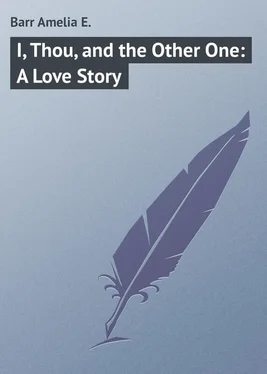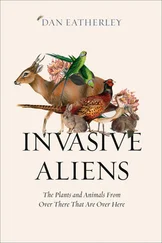Amelia Barr - I, Thou, and the Other One - A Love Story
Здесь есть возможность читать онлайн «Amelia Barr - I, Thou, and the Other One - A Love Story» — ознакомительный отрывок электронной книги совершенно бесплатно, а после прочтения отрывка купить полную версию. В некоторых случаях можно слушать аудио, скачать через торрент в формате fb2 и присутствует краткое содержание. Жанр: foreign_prose, на английском языке. Описание произведения, (предисловие) а так же отзывы посетителей доступны на портале библиотеки ЛибКат.
- Название:I, Thou, and the Other One: A Love Story
- Автор:
- Жанр:
- Год:неизвестен
- ISBN:нет данных
- Рейтинг книги:3 / 5. Голосов: 1
-
Избранное:Добавить в избранное
- Отзывы:
-
Ваша оценка:
- 60
- 1
- 2
- 3
- 4
- 5
I, Thou, and the Other One: A Love Story: краткое содержание, описание и аннотация
Предлагаем к чтению аннотацию, описание, краткое содержание или предисловие (зависит от того, что написал сам автор книги «I, Thou, and the Other One: A Love Story»). Если вы не нашли необходимую информацию о книге — напишите в комментариях, мы постараемся отыскать её.
I, Thou, and the Other One: A Love Story — читать онлайн ознакомительный отрывок
Ниже представлен текст книги, разбитый по страницам. Система сохранения места последней прочитанной страницы, позволяет с удобством читать онлайн бесплатно книгу «I, Thou, and the Other One: A Love Story», без необходимости каждый раз заново искать на чём Вы остановились. Поставьте закладку, и сможете в любой момент перейти на страницу, на которой закончили чтение.
Интервал:
Закладка:
“Are you really going to Parliament, Father?”
“Wouldst thou like me to go, Kate?”
“Yes, if I may go to London with you.”
“It isn’t likely I would go without thee. Did thy mother tell thee, Lord Exham has come back from Italy to sit for Gaythorne.”
“A long way to come for so little,” she answered. “Why, Father! there are only a few hovels in Gaythorne, and all the men worth anything have gone to Leeds to comb wool. Poor fellows!”
“Why dost thou say ‘poor fellows’?”
“Because, when a man has been brought up to do his day’s work in fields and barns, among grass, and wheat, and cattle, it is a big change to sit twelve hours a day in ‘the Devil's Hole,’ for Martha Coates told me that is what the wool-combing room is called.”
“There is no sense in such a name.”
“It is a very good name, I think, for rooms so hot and crowded, and so sickening with the smells of soap, and wool, and oil, and steam. Martha says her lads have turned Radicals and Methodists, and she doesn’t wonder. Neither do I.”
“Ay; it is as natural as can be. To do his duty by the land used to be religion enough for any Yorkshire lad; but when they go to big towns, they get into bad company; and there couldn’t be worse company than those weaving chaps of all kinds. No wonder the Government doesn’t want to hear from the big towns; they are full of a ranting crowd of Non-contents.”
“Well, Father, if I was in their place, and the question of Content, or Non-content, was put to me, I should very quickly say, ‘Non-content.’”
“Nobody is going to put the question to thee. Thy mother has not managed to bring up a daughter any better than herself, I see that. Kate, my little maid, Lord Exham will be here to-day; see that thou art civil enough to him; it may make a lot of difference both to thee and me.”
“John Atheling!” cried his wife, “what a blunderer thou art! Why can’t thou let women and their ways alone?”
When they rose from the breakfast-table, the Squire called for his horse, and his favourite dogs, and bustled about until he had Mrs. Atheling and half-a-dozen men and women waiting upon him. But there was much good temper in all his authoritative brusqueness, and he went away in a little flurry of éclat, his wife and daughter, his men and maid-servants, all watching him down the avenue with a loving and proud allegiance. He was so physically the expression of his place and surroundings that not a soul in Atheling ever doubted that the Squire was in the exact place to which God Almighty had called him.
On this morning he was dressed in a riding suit of dark blue broadcloth trimmed with gilt buttons; his vest was white, his cravat white, and his hat of black beaver. As he galloped away, he swept it from his brow to his stirrups in an adieu to his wife and daughter; but the men and women-servants took their share in the courtesy, and it was easy to feel the cheer of admiration, only expressed by their broad smiles and sympathetic glances. As soon as “the Master” was out of sight, they turned away, each to his or her daily task; and Kate looked at her mother inquiringly. There was an instant understanding, and very few words were needed.
“Thou hadst better lose no time. He might get away early.”
“He will not leave until he sees us, Mother. That is what he came to Atheling for,–I’ll warrant it,–and if I don’t go to the village, he will come here; I know he will.”
“Kitty, I can’t, I can’t trust to that–and you promised.”
“I am going to keep my promise, Mother. Have my mare at the door in ten minutes, and I will be ready.”
Mrs. Atheling had attended to this necessity before breakfast, and the mare was immediately waiting. She was a creature worthy of the Beauty she had to carry,–dark chestnut in colour, with wide haunches and deep oblique shoulders. Her mane was fine, her ears tremulous, her nostrils thin as parchment, her eyes human in intelligence, her skin like tissue-paper, showing the warm blood pressing against it, and the veins standing clearly out. Waiting fretted her, and she pawed the garden gravel impatiently with her round, dark, shining hoofs until Kate appeared. Then she uttered a low whinny of pleasure, and bent her head for the girl to lay her face against it.
A light leap from the groom’s hand put Kate in her seat, and a lovelier woman never gathered reins in hand. In those days also, the riding dress of women did not disfigure them; it was a garb that gave to Kate Atheling’s loveliness grace and dignity, an air of discreet freedom, and of sweet supremacy,–a close-fitting habit of fine cloth, falling far below her feet in graceful folds, and a low beaver hat, crowned with drooping plumes, shadowing her smiling face. One word to the mare was sufficient; she needed no whip, and Kate would not have insulted her friend and companion by carrying one.
For a little while they went swiftly, then Kate bent and patted the mare’s neck, and she instantly obeyed the signal for a slower pace. For Kate had seen before them a young man sitting on a stile, and teaching two dogs to leap over the whip which he held in his hand. She felt sure this was the person she had to interview; yet she passed him without a look, and went forward towards the village. After riding half-a-mile she took herself to task for her cowardice, and turned back again. The stranger was still sitting on the stile, and as she approached him she heard a hearty laugh, evoked doubtless by some antic or mistake of the dogs he was playing with. She now walked her mare toward him, and the young man instantly rose, uncovered his head, and, pushing the dogs away, bowed–not ungracefully–to her. Yet he did not immediately speak, and Kate felt that she must open the conversation.
“Do you–do you want to find any place?” she asked. “I think you are a stranger–and I am at home here.”
He smiled brightly and answered, “Thank you. I want to find Atheling Manor-house. I have a message for Mrs. and Miss Atheling.”
“I am Miss Atheling; and I am now returning to the house. I suppose that you are the Wrestler and Orator of last night. My father told us about the contest. Mother wishes to talk with you–we have heard that you know my brother Edgar–we are very unhappy about Edgar. Do you know anything of him? Will you come and see mother– now – she is very anxious?”
These questions and remarks fell stumblingly from her lips, one after the other; she was excited and trembling at her own temerity, and yet all the time conscious she was Squire Atheling’s daughter and in her father’s Manor, having a kind of right to assume a little authority and ask questions. The stranger listened gravely till Kate ceased speaking, then he said,–
“My name is Cecil North. I know Edgar Atheling very well. I am ready to do now whatever you wish.”
“Then, Mr. North, I wish you would come with me. It is but a short walk to the house; Candace will take little steps, and I will show you the way.”
“Thank you.”
He said only these two words, but they broke up his face as if there was music in them; for he smiled with his lips and his eyes at the same time. Kate glanced down at him as he walked by her side. She saw that he was tall, finely formed, and had a handsome face; that he was well dressed, and had an air of distinction; and yet she divined in some occult way that this animal young beauty was only the husk of his being. After a few moments’ silence, he began that commonplace chat about horses which in Yorkshire takes the place that weather does in other localities. He praised the beauty and docility of Candace, and Kate hoped she was walking slowly enough; and then Cecil North admired her feet and her step, and asked if she ever stumbled or tripped. This question brought forth an eager denial of any such fault, and an opinion that the rider was to blame when such an accident happened.
Читать дальшеИнтервал:
Закладка:
Похожие книги на «I, Thou, and the Other One: A Love Story»
Представляем Вашему вниманию похожие книги на «I, Thou, and the Other One: A Love Story» списком для выбора. Мы отобрали схожую по названию и смыслу литературу в надежде предоставить читателям больше вариантов отыскать новые, интересные, ещё непрочитанные произведения.
Обсуждение, отзывы о книге «I, Thou, and the Other One: A Love Story» и просто собственные мнения читателей. Оставьте ваши комментарии, напишите, что Вы думаете о произведении, его смысле или главных героях. Укажите что конкретно понравилось, а что нет, и почему Вы так считаете.












